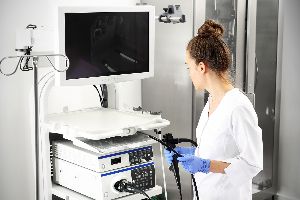What to Know About Colon Cancer

As the third most commonly diagnosed form of cancer in the United States, colon cancer affects thousands of patients annually. It occurs when tumors form within the large intestine. Thankfully, diagnoses have decreased over the decades, largely due to the prevalence of colon cancer screening appointments. Here’s what you should know about the disease and how it's treated.
What Causes Colon Cancer?
While the exact cause of this disease isn't known, doctors believe that some factors may point to an increased risk in certain individuals. The key reason for the disease begins within damaged cells that feature compromised DNA. When the DNA changes significantly, the cells may become cancerous.
It’s also possible for noncancerous polyps that grow on the colon to lead to cancer eventually. In particular, an adenomatous polyp that develops on the large intestine’s inner walls may increase a person’s risk.
If left undetected, the cells can spread to other parts of the body through the blood. A family history can also increase the likelihood of developing the disease, which is why it’s imperative to schedule regular colon cancer screenings.
What Are the Symptoms?

People don’t often experience symptoms in the early stages of the disease, but some that might occur include bloody stools, bloating, abdominal pain, nausea, loss of appetite, and fatigue. The symptoms that occur in the later stages include constipation or diarrhea, changes to the composition and consistency of the stool, bright red blood from the rectum, weakness, inexplicable weight loss, and iron deficiency anemia. Female patients who are anemic may also develop irregular menstrual cycles.
How Is Colon Cancer Treated?
The first approach is typically surgical intervention, which involves removing any cancerous polyps. In some cases, the doctor may elect to remove a portion or all of the colon. Lymph nodes near the affected area may also be removed to prevent the disease from spreading. Chemotherapy is used to kill the cancerous cells and prevent them from dividing and spreading further.
While there's no certain way to prevent the disease, it’s advisable to follow a consistent diet, reduce your intake of red meat and saturated fats, and maintain a healthy weight. It’s also best to schedule your screenings regularly beginning at age 50.
If you seek a reliable and trustworthy professional for colon cancer screening in Prospect, CT, turn to Naugatuck Valley Gastroenterology Consultants. Proudly serving patients throughout New Haven County since 1989, they offer a variety of treatments for digestive disorders of all types. Visit the website for more information, or call (203) 756-6422 to schedule an appointment.
About the Business
Have a question? Ask the experts!
Send your question

